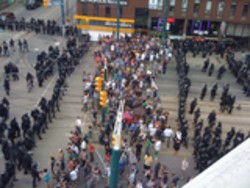G20 security response worrying for democracy: Rights group
Joanna Smith
The security response at the G20 summit in Toronto, where police arrested more than a thousand protestors, raises fundamental questions about the health of democracy in this country, said the Canadian Civil Liberties Association.
“It was a sad weekend for civil liberties in Canada. We can do better,” Nathalie Des Rosiers, the general counsel for the national advocacy group, told the Commons public safety committee Wednesday.
The committee is investigating the security response to the summit last June, which saw rioting in downtown Toronto streets and mass arrests of about 1,100 people with all but a hundred of them eventually being let go.

“Space and mobility were redefined, weaponry was redefined, privacy was redefined,” Des Rosiers told MPs, noting that while such redefinitions may have been necessary, they were done behind closed doors without any input from the public. “It’s not true that there was martial law declared during the G20 weekend in Toronto. . . . This is dangerous. Our system of government requires that all powers be exercised according to law.”
Her testimony followed the firsthand accounts of two young women from Montreal, Jacinthe Poisson and Wissam Mansour, who were both arrested during a mass arrest at a University of Toronto residence on the final day of the summit, June 27.
“Conditions inside the detention centre were . . . dehumanizing and humiliating,” said Poisson, who said her eyeglasses and her cellular phone were confiscated during the arrest and she did not receive them again for three days.
“We all had to sleep on the floor next to one another to try to stay warm, and the light was on very bright 24 hours a day, so I slept very little,” said Poisson of conditions inside the detention centre on Eastern Ave. in Toronto. “We were in cages.”
Both Poisson and Mansour also alleged that police officers were discriminating against them as French-speaking women from Quebec, with Mansour accusing one officer of calling her a “f—-ing foreigner”.
Poisson described how she felt she was being discouraged from protesting peacefully in the future and that she has lost faith in the Canadian democratic system.
“I have lost my trust in the democratic process and my country,” said Poisson, who was charged with conspiring to commit a criminal act, which was later dropped.
Conservative MP Brent Rathgeber (Edmonton-St. Albert) drew chuckles from spectators attending the committee meeting when his line of questioning made him appear incredulous that anyone would want to protest a summit without the intent to set police cars on fire.
“What did you hope to accomplish? . . . Somehow affect public policy?” Rathgeber asked Mansour, who later told him wryly that he had a good sense of humour. “What is your long-term goal? Is it to overthrow the Harper government or to defeat capitalism generally?”
“It is healthy in a democratic society to have people expressing their views, even if their not the government’s views,” said Poisson, a sentiment that was later echoed by Des Rosiers.
“The moment that our international leaders can meet in Toronto and there are no members of the public to say, ‘Yes, we agree with you’ or ‘No, we don’t agree,’ we will have lost democracy,” Des Rosiers said.
Source: http://www.thestar.com/news/canada/article/882054--g20-detention-centres-dehumanizing-testimony



